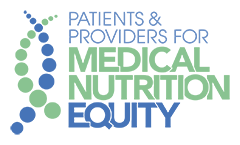As a clinical dietitian in a clinic setting more than 75% of my time was spent managing covering for medical foods. These tasks included (but not limited to): letters of medical necessity, prior authorization forms (per insurance company–ie each company has its own form), pulling relevant medical records, faxing forms & records, re-faxing and re-faxing forms & records (because these large faxes frequently have errors). If I estimate my time at 75% then based on salary costs that is approx $60.000 per year. Now, I was not the only dietitian doing these, we had a team of 6 clinic dietitians, so an estimate for my small hospital is $360,000 per year. Not only is this method costly it is deleterious to the ability to perform direct patient care.
For many of the conditions under this proposed bill medical foods is the only medical treatment, for others it is the primary. When patients do not have access it impacts their health directly (negatively). When they have unreliable sources of their treatment, their mental health suffers.
My biggest frustration with the lack of coverage of medical foods is that these are NOT foods like those that we purchase from our grocer, they ARE medical treatments just like medications. The party with the condition CANNOT be healthy without them in the exact same manner that a person with diabetes type 1 cannot live without insulin.
